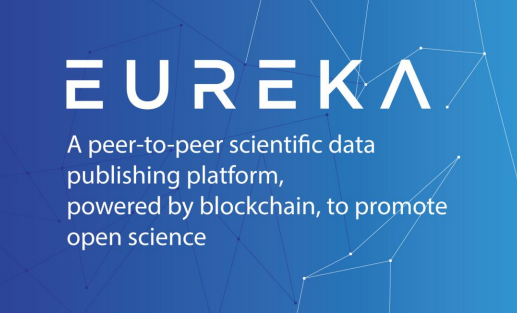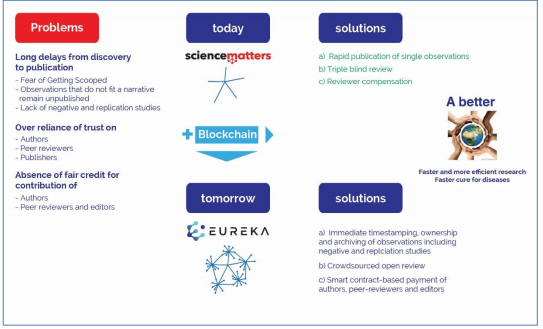
As publishers using a new metric which could be used to evaluate admissions more quickly thus speeding up the publication procedure. Our review process will also allow writers to revise and improve the document. When the paper is changed, final review and evaluations will be publicly appended to the preprints. These preprints or observations with reviews and ratings will be archived through the EUREKA decentralised and dispersed system. In instances where the author wishes to publish in a conventional journal, the scores could be moved to the journals.
This will provide an ideal method for research data management which reduces the need to rely on trust alone in publishers and writers. All the procedures and outputs (e.g. data, protocols, code) are open and transparent, therefore ensuring maximum reliability and confirmation. We can gain access to research without even putting up obstacles. Using blockchain technology, we can reduce cases of single points of failure. Researchers themselves are entirely in charge of the whole process of dissemination. There's not any chance of this information ever disappearing, because of the distributed nature of blockchain.

Decisions on career advancement, tenure, funding, and awards are mainly based on where the study is published, leading to pressure on researchers to publish in conventional"high impact" journals. EUREKA will have the first blockchain-based scientific rating system, preprint server, and only monitoring platform that offer dependable, immutable scores on research data which may be moved on the blockchain to funders, institutions and straight to journals. Thus, sources of financing could make decisions based on evaluations and testimonials on the EUREKA Platform. Decisions on career advancements: Scores and assessment of a particular study for which the study metadata has been listed on the EUREKA Platform can be transferred to universities and institutions to be used when a researcher is considered for promotion, tenure, or awards. Preprints could substitute the immediate evaluation for career advancement based on conventional publishing and its journal-based metrics with EUREKA evaluations. The evaluation process for these prizes takes into consideration where the writers are published, and consequently, our rating and review system on research information could eventually form part of the criteria for choice. The award committee could take into consideration both the crowdsourced annotation also expert-guided reviews and evaluations rather than the present means of just judging where a work was published.
An artificial intelligence-based prediction tool will use proprietary algorithms that will identify related observations and studies by cross-referencing annotations and connect them to form a story. This technology can be leveraged to predict targets for drug development. The EUREKA Platform ensures that its material is archived through a distributed server system. Raw data is available on the stage and sharing is encouraged by all writers. Due to the value of information in research, the sharing of raw data will shortly be a mandatory part of every submission. Automated data analysis tools using data templates will be designed to encourage community-based analysis of essential and formatted data.
The present system in academia incentivises investigators to postpone publishing study until they have a sufficiently large'narrative' to be able to further their careers. Because of this, many years can pass until significant findings are printed. A researcher can instead publish multiple single observations about the EUREKA Platform, providing different scientists with the opportunity to incorporate these observations into their research. This will be especially helpful for junior researchers seeking to make an early mark in their professions. On the EUREKA Platform, by allowing smart-contract based obligations, reviewers will be rewarded for conducting peer reviews in tokens. ScienceMatters is the first customer to implement this technology. Now, ScienceMatters is one of the few publishing houses which pays peer reviewing financially but using fiat payments leads to high fees and delays in payments. On the EUREKA Platform, tokens will be used to incentivise review with the quick and acceptable amount. Discoveries from publicly funded research are currently published in journals which then gain from the publication of the findings, while writers aren't rewarded. The EUREKA Platform will immediately pay writers with EUREKA tokens, whose job is later used by others.
The EUREKA Platform will attract researchers that have good ideas and micro-proposals directly connected with funding agencies, individual funders, investors that are interested in financing new ideas. The procedure for vetting proposals will be achieved through a voting procedure, which will allow qualified investigators to upvote and downvote suggestions and leave comments.
Additional Information and Investor Resources:
 Visit the EUREKA website
Visit the EUREKA website
 Read White Paper
Read White Paper
 Join Telegram Community
Join Telegram Community
 Read ANN Thread
Read ANN Thread
Follow Social Media
 FACEBOOK
FACEBOOK
 TWITTER
TWITTER
 GITHUB
GITHUB

Author : thefuturecurrency